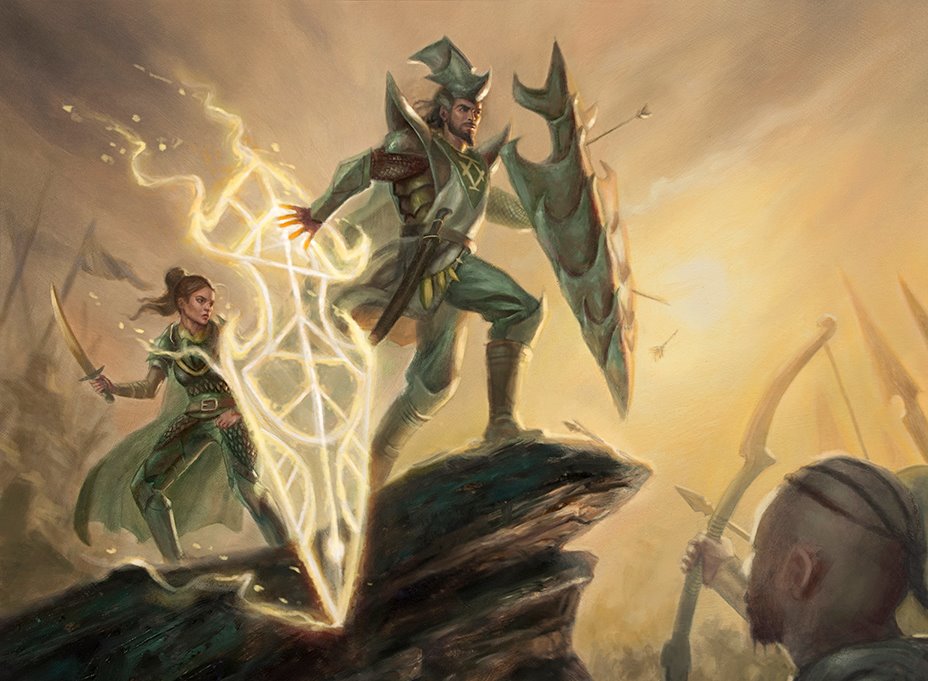Commander is a fickle thing, but there is a real beauty to that. Some days, you’re on top of the world because you’ve won when playing Phage, The Untouchable, and you know exactly how to cast her without losing. Other days, you’re playing Breya, Etherium Sculptor, and you tap out into a Vandalblast. Regardless, you know you’re in for some wild times in this format.
What is just as fickle is the amount of people you may have present at your store’s Commander night. Last time, we went through what gameplay is like with only three players; and so today, we’ll get into five-person games. In particular, we’ll do this in the lens of a great Commander variant for five players: Usurper.
What exactly is Usurper? Simply put, it’s a Commander variant that uses hidden roles for players, to guide gameplay and give it a sense of direction. This makes the game easier to follow, and allows it to end quicker than a free-for-all. To start the game off, go to your store’s basic land station and pick out a plains, forest, swamp, and two mountains. These are how you’ll distribute the roles. You shuffle them up and hand them out, face down, to the players.
The roles are as follows:
- The Sovereign [Plains]: The goal of this player is to stay alive by any means. They win when the Assassins and the Traitor are eliminated.
- The Guard [Forest]: The goal of this player is to keep the Sovereign alive. They win when the Sovereign wins, and lose alongside them as well.
- The Assassins [Mountain]: There are two of these players, and their goal is to eliminate the Sovereign at any cost.
- The Traitor [Swamp]: The goal of this player is to eliminate the Sovereign last. More to come about this role later.
Whoever gets the role of the Sovereign reveals their card immediately. All other players keep their cards face down, and their identities are not revealed until the game is over. Play begins with the Sovereign, and progresses like regular Commander. Life totals are pegged at 40 life, and Commander damage rules remain the same.
Now that we have the groundwork laid out, let’s get into the tactics of each role.

The Sovereign
The Sovereign has a pretty easy start to the game, since they can develop their board state without much opposition. They will likely be the first to take the lead, especially if they’re piloting a defensive pillowfort-style deck. They have the responsibility of keeping the board in check, with the Guard’s help. However, the Sovereign has to be careful, since every player will tell them that they’re the Guard. They’re doing that to keep some of the Sovereign’s heat off their back, whereas the one true Guard is just telling the truth. Eventually, their true colors come out, but the Sovereign has to try and read between the lines. One wrong move and it could spell disaster.
My tip for the Sovereign: Keep your shields up more than you might think, since you never know when someone will go for an all-out strike on you. Your early plays will usually go unanswered, so take advantage of that head start.

The Guard
The Guard is the most honest player at the table. They will work to protect the Sovereign, and take an active role to support those moves. For instance, the Guard may counter a board wipe that hurts the Sovereign, or remove a pesky permanent that interrupts the Sovereign’s strategy. Since everyone else is pretending to be the Guard, playing as the actual Guard can be a thankless job. Sometimes they’ll develop the most threatening board state, and be taken out by the Sovereign by accident. But, they can still lay claim to the victory if the Sovereign survives to the end.
My tip for the Guard: Pace your development to match the Sovereign, because they might see you as a threat if you’re faster than them. Someone may fool the Sovereign into thinking that they’re the true Guard, but that shouldn’t dissuade you from doing your job until the very end. It’s okay to sacrifice yourself, if it ensures a later victory.

The Assassins
The Assassins are next, and this is where things start to get spicier. Since there are two of them, they never quite know who the other one is, until one takes a swing at the Sovereign. Until then, they’re left to quietly develop and keep the attention off of them. Usual tactics for Assassins will be to attack a few other players at the table, to try and buy the trust of the Sovereign. Again, this all plays into the mystery of who the real Guard is. There will come a time where one of the Assassin’s has to put it all on the line, and then the game begins to end after that. Things start progressing a lot faster once that first attempt has been made.
My tip for the Assassins: Try and save your winning move for one turn, particularly when the Sovereign has their shields down. You don’t always know who the other Assassin is, but if you time it right, they may end up delivering the winning blow after you. When it comes to table order, if you’re the last player to go before the Sovereign, try to bide your time and wait for the other Assassin to strike first. That way, you can get two Assassin attacks in before the Sovereign gets to untap.

The Traitor
In my opinion, this is both the most challenging and most exciting role to play. The Traitor has to walk a fine line between working with the Sovereign and Guard, and then turning on them when the Assassins are eliminated. Doing this requires careful watch of the game state, making sure to not be pegged as the biggest threat in the early stages. To be successful as the Traitor, one has to convince the Sovereign that they’re the Guard. It’s not easy, but gaining that trust will allow the Traitor to grow their board state at a faster rate than the Guard. Also, it will position them to come out ahead when a few players are eliminated.
In a perfect world, players would start eliminating each other, allowing the Traitor to save precious time and energy. However, with pretending to be the Guard, the Traitor has to do more heavy lifting to police the board. Only then can they steer the game to the ideal scenario. It’s a delicate path to take, but it rewards smart play and good decision making
My tip for the Traitor: Try hard to protect the Sovereign, but don’t try too hard. It’s okay to hold back a bit to let them take some hits, since that will weaken them up for you later. You have to come up with a good alibi, though, when the Sovereign asks why you couldn’t protect them that turn. It’s a risky proposition, but it makes your odds a lot better when it’s time to take out the remaining players. The more players take each other out, the less work it means for you in the end. The Sovereign may ask you to make some sacrifices, to prove to them that you’re the Guard, but only do so when it ensures you stay in the game.
Ending the game
The more you play Usurper, the more you’ll see it follow this path of action: the players develop and chip away at everyone but the Sovereign. Then, one Assassin will choose to go all-in at the Sovereign. Since a second role is revealed there, it gives the game more direction. This kickstarts the majority of the action, and it’s non-stop haymakers until the game is over. One side will eventually win, and you’ll find that it can be about the same run time as a regular four-player game of Commander.
House Rules
Your playgroup may have various house rules for Usurper, and so here a few of my suggestions.
In my group, our biggest house rule for Usurper is that we don’t allow infinite combos. While they’re perfectly fine elsewhere, we’ve found that infinite combos invalidate nearly all of the political interplay of this variant. If you end up going infinite, it doesn’t really matter which role you had in the end, and the roles are the biggest factor that makes Usurper unique. So by keeping our combo decks on the side, it allows for interaction and playstyle that blossoms in Usurper.
Another house rule that works is having all of the non-Sovereign players start at 30 life instead of 40. This helps speed up the pace of the game, and helps prevent board stalls. There is plenty of debate about going down to 30 life for Commander as a whole, but that’s a different topic for a different time.
Finally, some groups like to have the Assassin’s be aware of each other before the game starts. However, I have found that that gives them too much of an advantage. There are ways to figure out who the other Assassin is through gameplay, and that advanced knowledge doesn’t really help an Assassin grow those skills as a player.
Usurper is fantastic way to involve four of your friends in Commander, without having to have one sit out. With plenty of table politics and negotiation, it ensures exciting and engaging gameplay. Also, it allows you to develop those soft skills related to communication, which can always help in regular four-person Commander. So keep your eyes peeled, play smart, and you just might make it out alive.
Travis is a Connecticut-based player and writer, who has been turning things sideways since Starter 1999. He primarily plays Commander, Pauper, and Modern, and has a passion for introducing new players to the game. When he isn’t attacking with red creatures, he can be found mountain biking or playing the guitar. You can follow his exploits here on Twitter and Instagram.

